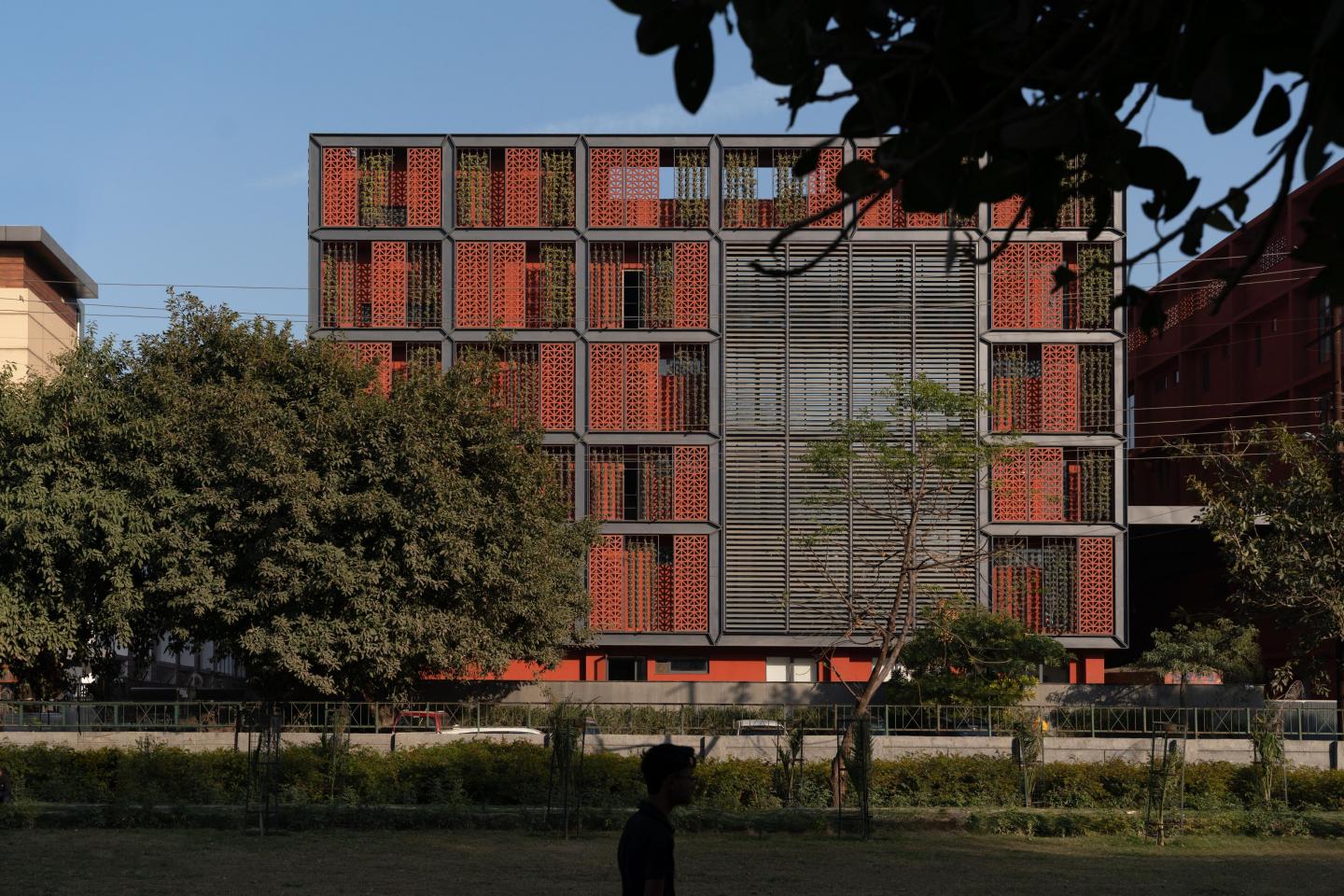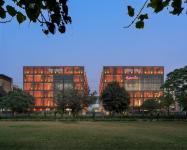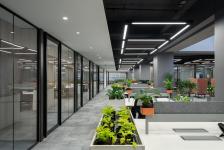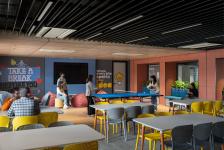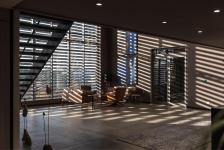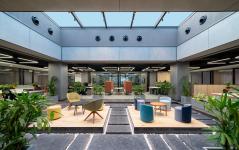Every building tells a story, not just of structure, but of its soul. With The Twin Habitat, designed for Fybros in Sector 63, Noida, we set out to redefine what an industrial space can be. Spread across a 4,440 sq.m site with a total built-up of 1,80,000 sq.ft of warehouse including 36,000 sq.ft of commercial office space, crafted not just for efficiency, but for well being. What began as a brief to build a functional industrial facility evolved into something more meaningful: a nature-embracing, future-ready, user-first habitat that blends the rugged spirit of industry with the calm, restorative rhythm of nature.
This project is beyond stacking goods or housing operations. It began with the idea of rethinking how industry and human experience can co-exist, with nature at the centre.
The Design Intent: Beyond Four Walls
The new mixed-use complex for Fybros Electricals in Noida combines a modern warehouse and a unique office space.
The client, Fybros known for their high-quality electrical products came to us with a vision: a space that reflects their core values of durability, efficiency, and sustainability. This perfectly aligned with our philosophy of Nature-Integrated Design (NID), a two-pronged strategy focusing on Habitability and Sustainability.
Habitability is about health and well-being of the users - natural light, ventilation, and biophilia.
Sustainability is about responsibility - reducing energy, conserving water, and preparing for a changing future.
Together, they guided our approach at every level, from the ground beneath to the sky above.
________________________________________
Client Brief & Design Approach
Fybros is a leading manufacturer of electrical goods. Their products are known for their durability and energy efficiency, two qualities closely linked to sustainability. This commitment to sustainability is shared by BASICS, expressed through their core philosophy of Nature-Integrated Design (NID).
The project serves two primary user groups: office employees and warehouse workers. The design focused on providing comfort, convenience, and a strong connection to nature for both groups, despite the differences in their work environments. BASICS also drew upon the idea of Hedonistic Sustainability, a design approach that encourages sustainable choices through pleasurable experiences and community-focused spaces.
To make the building future-proof, BASICS planned for likely changes in zoning and land use, a common trend in industrial areas where industries are gradually moved out and replaced by residential or commercial developments as cities grow. Flexibility and modularity were built into the design to ensure long-term usability. The design also respects the client’s wishes by incorporating Vaastu principles.
Workspace Design:
The corporate workspace covers 36,000 sq ft across the top two floors of the South Block. It has a separate entrance and lift lobby, accessed through a pre-reception area on the stilt floor. This makes the office functionally independent from the warehouse. The office reception is a double-height space filled with diffused sunlight from south-facing windows. Both floors open into this central space, connected by a sculptural staircase.
The office houses over 150 modular workstations, along with spaces for executive offices and support functions like HR, IT, and Accounting. Amenities include a cafeteria, a recreation zone, a smaller café, and a town hall. The office also features a showroom for Fybros products, a boardroom, several meeting rooms, a Director’s suite, and guest accommodations.
A defining feature of the workspace is the two courtyard-style lounges created under large skylights. These lounges have an outdoor feel, with wide views of the sky, abundant natural light, lush plants, and floors paved with wood, tiles, and decorative pebbles.
The office design balances space efficiency with user comfort. It avoids typical high-density layouts by creating smaller clusters of desks. These clusters improve privacy, reduce noise, and boost productivity. Meeting rooms, breakout zones, discussion pods, and call booths are placed between the clusters, creating a lively mix of private and shared spaces.
Recreational spaces are spread across both floors. From any desk, a lounge, café, or dining space is visible and easy to reach. This layout reinforces the idea of a workspace that values employee satisfaction as much as productivity.
Supporting both the warehouse and workspace, sustainability was embedded as a fundamental design driver across the project.
________________________________________
Energy & Resource Efficiency:
Following the principles of Nature-Integrated Design, the complex uses several climate-responsive and resource-efficient strategies.
Aluminum louvers and green walls reduce heat gain. Motorized louvers allow users to control indoor temperatures easily. Skylights bring in soft, natural light across the workspace, complementing the filtered light from the facades. This helps naturally light every part of the 27m-wide floor plate and reduces harsh glare.
Triple-glazed windows and durable, heat-reflective paint further improve insulation. Together, these measures help maintain indoor temperatures 4–5 degrees cooler than the outside. As a result, the air conditioning load is reduced by 20–25%.
The project also features water recycling and rainwater harvesting systems. Existing trees on the site have been preserved and woven into the landscape design. This reduces irrigation needs and protects the natural green cover, cutting water usage by up to 50%.
Energy use is lowered through smart lighting systems and energy-efficient LED fixtures, along with the extensive use of natural light. Rooftop solar panels further reduce the building’s dependence on grid electricity. Within the workspace, these combined measures have significantly reduced overall energy consumption.
The Twin Habitat redefines urban architecture through the lens of Nature-Integrated Design philosophy. By combining habitability and sustainability as a twin strategy, it directly addresses the growing issue of urban air pollution.
2021
2024
Contractors / Vendors
Civil Contractor: Pragya Associates
PEB: Epack Prefab
HVAC: Reagan Refrigeration / Daikin
Waterproofing: Auro Engineering
GRC: Pooja Concrete Fabricators
Façade Metal works: Trak Enterprises
Vertical Greens: ELT India
Glazing: Aluk
Horticulture – Green meadows landscape
Railings: Rinox Kaufmann Ltd
Lifts: Thyssen Krupp
Fire Doors: TATA Vikrant group
Plumbing Contractor: Metroid Engineers
Architecture Consultants: Basics Architects
Principal Architect: Vinod Singhi & Ranju Singhi
Design Team: Vinod Singhi, Ranju Singhi, Sudeshna Ganguly, Nishant Kumar, Akshay Chachra, Nikita Saini, Harapriya Behera
